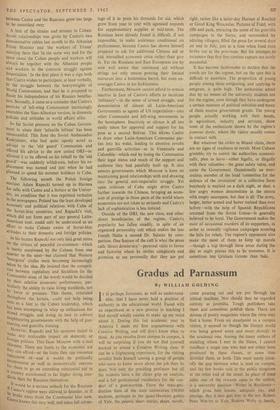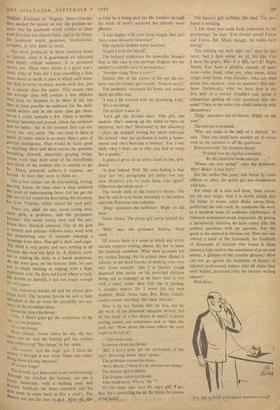Gra . dus ad Parnassum By WILLIAM - GOLFING I T is perhaps fortunate, as
well as understand- ' able, that I have never held a position of authority in the educational world. Faced with an experiment or a new process in teaching I find myself wholly unable to make up my mind about it. During this last academic year in America I made my first acquaintance with Creative Writing, and still don't know what to think. As you revolve from campus to campus, it will be surprising if you do not find yourself booked to attend a Creative Writing class. It can be a frightening experience; for the visiting novelist finds himself among a group of people who seem to know more about the job than he does. Not only the presiding professor but all the students have a far closer grip on analysis, and a full professional vocabulary for the con- duct of a post-mortem. From the mass-pro- duction lines of the state universities (50,000 students, perhaps) to the quasi-Oxonian gothic of Yale, the poems, short stories, plays, novels,
come pouring out and are put through the critical machine. Nor should they be regarded entirely as juvenilia, Tough publishers take them and sometimes publish them. There are dozens of poetry magazines where the verse may find a home. From my standpoint as a campus visitor, it seemed as though the literary world was being geared more and more directly to the academic one. Among the many authors of standing whom I met in the States, I cannot recollect a single one who had not either been produced by these classes, or some time directed them, or both. This must surely inten- sify the gap between what is read on campus, and the few books sold in the public drugstore at the other end of the street. In place of mass sates, one of the rewards open to the author, is a university position—Writer in Residence— which gives him leisure, adequate pay, and prestige. But it also gets him in the net. Robert Penn War: en at Yale, Eudora Welty at Smith, .THE SPECTATOR, SEPTEMBER 7. William Faulkner at Virginia State—whether they needed the money or not, the position en- sures that the academic world nibbles at them even if it does not absorb them; and in the States, the academic world, generous, international, complex, is very hard to resist.
The work produced in these seminars tends to fantasy, since it is guaranteed an educated and• highly critical audience. It is produced slowly too. Three short stories is a good year's work. Only at Yale did I find something a little more down to earth; a class in which each mem- ber had, to write so many words each day, just as a pianist does his scales. This means that the average class will contain a few students who have no business to be there at all; but they at least provide an audience for the dedi- cated writers and at the same time get them- selves a credit towards a BA. There is another section, bearded and jeaned, which has ambition and no talent : but in the seminar they can dis- cover this very early. The rest tend to have a spark of talent which is no more than a part of general intelligence. They would be fairly good at anything. Here and there occurs the genuine, bumbling, fettered, uncertain, groping writer, whose work may have none of the smoothness and finish of the student who is content to get by, These, potential authors 1 suppose, are helped. At least they seem to think so.
The actual classes can be entertaining, boring, moving, funny. At least once, a class achieved the level of embarrassing farce. Let me get the bile out of my system by describing this occasion, far from Virginia, which caused me such pain.
There are, shall we say, seven young men, three girls, a professor, and the peripatetic lecturer. The seven young men and the pro- fessor have identical crewcuts. One of the girls is homely and solemn—follows every word with the painstaking care of someone learning a language from discs. One girl is dark, and eager. The third is very pretty and says nothing at all because she does not have to. A choleric crew- cut is reading his story in a harsh monotone. As the story goes on the lecturer finds his ears not so much burning as singing, with a high, nightmare note. He does not know where to look. He broods to himself. I am not tough enough for this game.
The monotone breaks off and the silence pro- longs itself. The Lecturer fancies he sees a faint afterglow in the air from the incredible last sen- tence of the incredible story.
Someone clears his throat.
`lake, 1 didn't quite get the symbolism of the flair on the bathmat.'
'It's a sex image.' More silence. From where he sits, the lec- turer can see that the homely girl has written and underscored 'Sex Image' in her notes.
c he cookie,' says the eager girl. 'I liked the i.O?kie. I thought it was vivid. There was some- tclng about it kinda innocent.'
It's a sex image.' The ho
i rough mei)/ girl does some more underscoring. the window the lecturer can see a lovely landscape, with a bathing pool and flouters_ Suddenly his heart contracts and his eyes seem to come back in like a snail's. The a °wets are not for him to pick. After all, this
is what he is being paid for-..He fumbles through his stock of newly acquired but already worn phrases: 'I was happy with your focal length. But isn't there some obscurity timewise?'
The choleric student turns beetroot.
'Guess I write for myself.'
The lecturer suppresses the unworthy thought that in this case it was perhaps illogical for the author to read his story to an audience.
'Another thing. Does it carry'!
Silence. Out of the corner of his eye the lec- turer sees the homely girl record : 'Does it carry'?'
The professor uncrosses his knees and crosses them the other way.
'I was a bit worried with the plumbing, Jake.' 'It's a sex image.
The lecturer wades in.
'Let's get the picture clear. This girl, this student. She's making up her mind to have an abortion, isn't she? Motivated by her discovery —since she stopped writing her novel and read his instead—that her professor is really a homo- sexual and she's basically a lesbian? Yes. I see. Only what I don't see is why you had to make her a spastic.'
'I guess it gives us an extra slant on her, pro- fessor.'
'It does indeed. Well. My own feeling is that your last two paragraphs are rather low ten- sion. Oughtn't you to work them over again? Otherwise the whole story--' The words stick in the lecturer's throat. The best he can do is to beam winningly at the author and nod. Everyone else nods too.
'Zing,' murmurs the professor. 'Right on the nose.'
More silence. The pretty girl yawns behind her fist.
'Well,' says the professor briskly. 'Next week. . .
Of course there is a sense in which any writer attends creative writing classes. He has to learn the business somehow. What then accounts for my uneasy feeling that to attend these classes is inferior to the hard knocks of making your own way from scratch? Am I a literary rough diamond who insists on his wretched children being just as unhappy as he was? And to live with a class, rather than visit one in passing, is another matter; for I never felt my own students, Mark, Anna, Jane, Ben, Betsy, Geneli, could commit anything like these idiocies.
May it be my feeling that we live, not by the work of ten thousand adequate writers, but by the work of a few dozen at most? Creative writing classes are sometimes said to 'take the cork out.' How about the cases where the cork ought to be left in?
---The verses end.
Someone clears his throat.
'Bill. I don't quite get the symbolism of the stars throwing down their spears.'
The professor crosses his knees.
'Well, Harry, I think it's an obvious sex image.'
The homely girl scribbles.
The lecturer clears his throat, 'One small point. Who is "He"?'
'It's the super ego,' says the eager girl. 'I got that. He's controlling the id. He twists the sinews of his he,,art.' The homely girl scribbles like mad. The pro- fessor is nodding.
'I felt there was some basic confusion in the psychology,' he says. 'You should reread Totem and Taboo, Bill. Mind, though, the verses have energy.'
'I'm sticking my neck right out,' says the lec- turer, 'but I dare swear we all felt this. Can I have the paper, Bill—it is Bill, isn't it? Right. I'vlmm. You have a positive cascade of ques- tions—what hand, what eye, what deeps, skies, wings, what hand, what shoulder, what art, what dread feet, etcetera : and no answers! Not one Now. Technically, what we have here is the first half of a sonnet. Couldn't you recast it sonnetwise, getting all your questions into the octet? Then in the sestet you could come up with the answers.'
'Zing,' murmurs the professor. 'Right on the nose.'
The lecturer is inspired.
'Why not make it the half of a diptych,' he says. 'Then you could have another set of verses with all the answers to all the questions.'
Everyone nods. The lecturer chants : 'Framed was my fearful symmetry By this immortal hand and eye. . . 'Where are you going?' cries the professor. 'Hey! Blake! Come back!'
But the author has gone; and borne by some afflatus or other, the pretty girl has disappeared with him.
Yet when all is said and done, these classes are an easy target. And it is worth noting that for better or worse, when Blake leaves them, preferring his own road, he condemns his work to a hundred years of academic indifference. A balanced assessment seems impossible. By posing a paradoxical situation we have raised (like the author) questions with no answers. For the good in the method is obvious too. How can one convey a sense of the thousands, the hundreds of thousands of students who found in these classes a high road to the enjoyment of prose and poetry, a glimpse of the creative process? How can one go against the testimony of dozens of talented professional writers who all claim they were helped, produced even, by creative writing classes?
Well there.
'No, this is NOT a recorded announcement!'



































 Previous page
Previous page